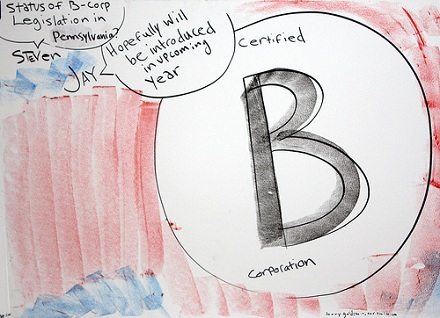
October 22, 2012; Source: Central Penn Business Journal
In light of all of the news recently about various corporations getting B corporation status, it is worth noting that in Pennsylvania, there is legislation on Gov. Tom Corbett’s desk that would officially allow corporations in the commonwealth to charter themselves as “benefit corporations” or “B-corps.” According to the Central Penn Business Journal, “B-Corps are for-profit companies that have chosen to make a set of values equal in importance to the overall profitability of the company.”
The sponsor of the bill is State Rep. Gordon Denlinger, a Republican from Lancaster County, who explains his support of B-corps in terms very close to the national political debates of our time: “B-Corps direct the entrepreneurial drive of American businessmen and businesswomen to aggressively address social and environmental problems without the waste and procrastination that often plague government programs that have similar goals,” according to Denlinger. His bill would make Pennsylvania one of a dozen states to enact B corporation legislation.
Sign up for our free newsletters
Subscribe to NPQ's newsletters to have our top stories delivered directly to your inbox.
By signing up, you agree to our privacy policy and terms of use, and to receive messages from NPQ and our partners.
The theory is that corporate directors would be allowed to take nonfinancial interests into consideration as opposed to focusing exclusively on maximizing profits. The B-corp designation would protect corporate directors from being “held liable for lost monetary value as a result of socially conscious decisions.” “By expanding a corporation’s legal structure to allow directors to make decisions for the good of society, and not just to maximize shareholder profits, consumers are able to support businesses that align with their values,” Denlinger adds.
Of course, nearly every corporation worth its 10-K U.S. Securities and Exchange Commission filing has a corporate social responsibility program, which one would assume has some element of acceptance of something less than solely maximization of profits. Corporations and their shareholders know that corporate social responsibility is actually good business as well as good for the community. There may be some corporate iconoclasts, drawn from the Milton Friedman wing of economic theory, who believe that corporations should do no philanthropy and no conscious social responsibility programming because, in the capitalist model, a well functioning and highly profitable corporation is the epitome of what capitalism can offer society. However, most corporations buy into corporate social responsibility as important and positive—and defensible.
If you put B corporations into the context of corporations trying to incorporate or exercise agendas of corporate social responsibility, there is the critique from the other side of the political spectrum, represented by former U.S. Labor Secretary Robert Reich. “The upsurge of interest in ‘corporate social responsibility’ is related to the decreasing confidence in democracy,” Reich contends, presaging Denlinger’s critique of government. “These days, reformers often say they find it easier to lobby corporate executives than to lobby politicians; they contend they can be more effective pushing certain large corporations to change their ways than altering public policy.” Reich argues, “the new interest in so-called ‘corporate social responsibility’ is founded on a false notion of how much discretion a modern public corporation has to sacrifice profits for the sake of certain social goods, and that the promotion of corporate social responsibility by both the private and public sectors misleads the public into believing that more is being done by the private sector to meet certain public goals than is in fact the case.”
Reich wrote those statements some years ago, before the upsurge in state legislative activity around B corporations and low profit limited liability corporations (L3Cs), but he hasn’t changed his stance. He tweeted earlier this month, “Beware ‘corporate social responsibility.’ CEOs shouldn’t decide what’s socially responsible. That’s the role of democracy.” Does his critique apply to B-corps and L3Cs? Or are they a different breed of corporate player that counters his argument about the false notions behind corporate social responsibility?—Rick Cohen












